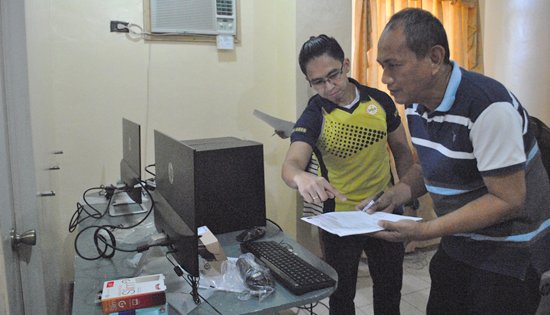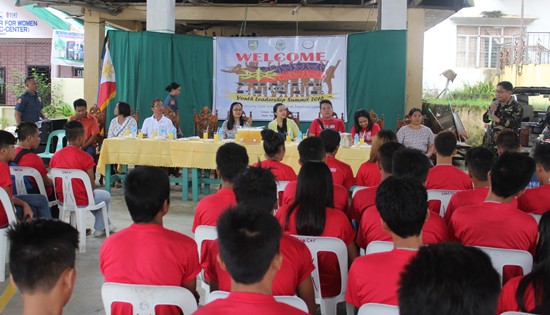|

Agrarian
Reform Secretary Rafael “Ka Paeng” Mariano (in checkered polo
shirt) distributes 1,058 certificates of land ownership award (CLOAs)
to 783 agrarian reform beneficiaries from five Leyte towns in
Barugo, Leyte. (Jose Alsmith L. Soria) |
783 Leyte farmers
receive CLOAs from Sec. Mariano
By JOSE ALSMITH L. SORIA
November 21, 2016
BARUGO, Leyte – Seven
hundred eighty-three farmers from five Leyte towns turned landowners
when Agrarian Reform Secretary Rafael Mariano handed to them
certificates of landownership award (CLOAs) during the Secretary’s
visit to Eastern Visayas early this month.
Mariano distributed the
1,058 CLOAs at the Apostol Gymnasium in this municipality.
He was assisted by Land
Registration Authority (LRA) Deputy Administrator Robert Leretana,
Mayor Maria Rosario Avestruz, Department of Agrarian Reform (DAR)
Regional Director Sheila Enciso, Assistant Regional Directors Ma. Fe
Malinao and Ismael Aya-ay, and Leyte Provincial Agrarian Reform
Program Officer Renato Badilla.
The CLOAs covered a combined
area of 1,427.5 hectares of farmlands situated in the towns of Barugo,
Alangalang, San Miguel, Carigara and Jaro.
Lolita Candaza, one of the
beneficiaries said, they can now avail of the various assistances
extended to “Yolanda” survivors by the different local and
international non-government organizations.
Mariano in his message
stressed that it is DAR’s goal to free farm workers from the bondage
of the soil.
During the said occasion he
announced that his administration will create a national LAD (land
acquisition and distribution) action team that will help strategize in
accelerating land distribution process nationwide.
He also disclosed that DAR
is now addressing the problem on the reconstitution of CLOAs that were
destroyed when the Registry of Deeds (ROD) in Palo was burned down in
the 90’s.
Meanwhile, Enciso thanked
the LRA for trimming down the requirements in the registration of
CLOAs resulting to the release of these land titles pending at the
ROD.
For the beneficiaries to
understand, Leretana explained that in the registration of an original
certificate of title (OCT) as in the case of these CLOAs, tax
declaration is required as proof of ownership.
But since ownership has
already passed thru several persons, it was difficult then to present
a tax declaration especially that the present owner has to pay unpaid
real property tax if ever the previous owners failed to pay them
before they could be issued with the said document, which according to
Leretana was the reason why they decided to take it out from the
requirements.
According to Badilla, San
Miguel has the most number of beneficiaries at 245 with 321 CLOAs
covering 233 hectares; Barugo has 222 beneficiaries of the 398 CLOAs
covering 280.1 hectares; Jaro has 147 beneficiaries of the 230 CLOAs
covering 684.6 hectares; Carigara has 123 beneficiaries of the 102
CLOAs covering 129 hectares; while Alangalang has 46 beneficiaries of
the 7 CLOAs covering 100.6 hectares.
Sueno: Assistance
to Disadvantaged Municipalities ‘different’ from BuB
By DILG
November 19, 2016
QUEZON CITY –
Interior and Local Government Secretary Ismael Sueno today said that
the DILG’s new Assistance to Disadvantaged Municipalities (ADM)
program is ‘different’ from the Bottom-Up Budgeting (BuB) program of
the previous administration.
Sueno said ADM is quite
distinct in terms of its objectives, type of projects, eligibility for
funding, projects identification scheme, and budget allocation per
local government unit (LGU).
He said that unlike BuB
whose main objective is citizen engagement and participation, ADM is
designed to assist LGUs in strengthening their ability to deliver
basic services.
“The ADM is anchored on the
need to somehow provide fiscal space to municipalities, to allow them
not to become too dependent on their Internal Revenue Allotment (IRA)
and to help LGUs utilize their local resources for other programs and
projects,” he said.
Sueno said that under the
new program, the local chief executive has to submit a project list
culled out from any of the existing plans of the municipality, unlike
in the BuB wherein civil society organizations are included in project
identification.
“The main trajectory of BuB
then was people participation. In ADM, we are more concerned in
helping the towns address the essential needs of their constituents,”
he said.
According to him, the
projects eligible for ADM assistance include the five basic
infrastructure that are most needed in municipalities – access roads,
potable water, evacuation centers, sanitation facilities, and small
water impounding.
The DILG Secretary also said
that the ADM, similar to the BuB, also imposes a governance
requirement wherein municipal governments have to meet good governance
standards prior to the release of funds to them. These standards
include passing the good financial housekeeping component of the Seal
of Good Local Governance (SGLG) and completion of assessment of its
Public Financial Management System.
He said that although not
all of the 1,373 out of the total 1,489 municipalities in the country
covered under the program may be considered ‘disadvantaged’, the ADM
looks at the magnitude of poverty in the area and not just at the
baseline income of the municipalities.
The DILG Chief also stressed
that there is no duplication or repetition of projects under the ADM
program with other national government agencies, noting that the P19.4
billion budget being proposed for ADM is for projects that are within
the scope of implementation of the DILG.
Workers group urges
employers to comply with mandated 13th month pay bonus
By Associated Labor Unions (ALU)
November 19, 2016
QUEZON CITY – All
rank-and-file employees including regular and contractual workers are
entitled to a 13th month pay cash bonus and they must assert their
rightful claim to it because it is mandated by law as incentive to
workers for helping the economy grow, reminds labor group Associated
Labor Unions (ALU) said yesterday.
“All rank-and-file employees
regardless of position, designation or employment status have all the
right to claim their thirteenth month pay cash bonus. Even if you are
employed for even at least a month during the calendar year or
receiving salary of P1,000 per month, they can avail of this bonus,”
said Alan Tanjusay, ALU spokesperson.
He clarified that 13th month
pay is different than Christmas bonus.
Christmas bonus is not
mandated by law but a discretionary act of goodwill on the part of the
employers. The Christmas bonus may come in the form of cash or kind or
combination of both.
However, the minimum 13th
month pay bonus is required by law. The bonus must be equivalent to a
month’s basic pay excluding allowances, overtime pay, premium pay,
night shift differential, holiday pay, profit-sharing payments, cash
equivalent of unused vacation and sick leave.
Tanjusay said the bonus must
be received in cash not in kind. “Employers must give it in cash. If
employers convert it to rice or grocery items, it’s not 13th month pay
bonus anymore. The bonus must be in cash. If they want to give rice
and grocery items, it is welcome but it must be received as additional
bonus.”
“Hindi rin po pwede na
utangin ng employer ang 13th month pay bonus na ito sa kanyang
manggagawa. Bawal po ito,” he added.
He called on the
government’s Department of Labor and Employment (DOLE) to strongly
enforce the law because some abusive employers resort to different
schemes and tactics to avoid paying the mandated thirteenth month
bonus.
He said aside from
converting thirteenth month bonus to grocery items, gadgets or
appliances, some employers resort to giving token or raffle draw
certain amount or gadgets and appliances to avoid paying thirteenth
month pay.
According to the rules and
regulation of Presidential Decree 851 otherwise known as 13th Month
Pay Law, the 13th month pay shall be paid not later than December 24.
However, an employer may give to his or her employees half of the 13th
month pay before the opening of the regular school year and the
remaining half on or before December 24 every year.
There are around 920,000
work establishments in the country employing 39 million workers in
various major industry enterprises including agriculture,
manufacturing and services sectors.
|

DILG-8
Information Technology Officer Luis de Asis shows LGU
representatives the specifications of the computers donated by
the Japanese government through ADB and DILG to fast track CLUP
preparation. |
ADB, DILG give out
computers for 33 Yolanda LGUs to hasten CLUP preparation
By MYLES JOSEPH E. COLASITO
November 18, 2016
TACLOBAN CITY –
Thirty-three (33) local government units battered by Super typhoon
Yolanda (Haiyan) recently received computer sets and Global
Positioning System (GPS) units and other equipment that would be
useful in improving disaster resiliency in Eastern Visayas region.
The 33 LGUs in Eastern Samar,
Samar and Leyte provinces benefited from the grant from Asian
Development Bank under the Japan Fund for Poverty Reduction (JFPR) in
cooperation with the Department of the Interior and Local Government (DILG),
said Regional Director Marivel Sacendoncillo of DILG-8.
The computer sets received
by these LGUs carried the highest specifications such as Core i7,
powered with 16 Gigabyte Random Access Memory (RAM), with 1 Terabyte
Portable Hard Drive, and a pocket wifi, more than enough for the needs
of municipal planning units in processing data on the Comprehensive
Land Use Plan (CLUP), said Dir. Sacendoncillo. These were paired with
two (2) hand-held GPS units for creating maps of the terrain in the
LGU.
Dir. Sacendoncillo projects
that about ten (10) LGUs would be able to complete drafts of their
respective CLUP maps by the end of the year. She added that two (2)
other computers were donated to the DILG-8 Regional Office as backup
servers for all data to be produced by the recipient LGUs.
“[The computers] are timely
and appropriate assistance extended in our effort at accurate GIS
mapping for our various programs, projects and activities. This will
go a long way in making our communities safer and more secured,” said Rosana Lumpas of the Municipal Planning and Development Office of
Babatngon, Leyte.
The DILG-ADB Project forms
part of technical component of the Japan International Cooperation
Agency (JICA) assistance for LGUs affected by Super typhoon Yolanda
under JFPR. The group held a series of coaching sessions to enable
LGUs to update their CLUPs, which are documents designed to guide the
long-term plans of the LGUs.
Youth empowered as
advocates for peace and development in Matuguinao

By 43rd Infantry Battalion,
8ID PA
November 15, 2016
LOPE DE VEGA, Northern,
Samar – Youth Leadership Summit (YLS) was conducted on November
3-5, 2016 at Brgy Maduroto, Matuguinao, Western Samar with the joint
effort of 43IB, 8ID, PA and LGU-Matuguinao, with the theme:
“Initiating Youth Actions Towards an Empowered Generation”.
The Youth Leadership Summit
is one of the priority project of Hon. Melissa dela Cruz, Mayor of
Matuguinao, Western Samar, it is composed of 106 youth coming from
different barangays of Matuguinao, Samar. The main objectives of YLS
are to develop the youth to become responsive individuals and to
empower them as advocates and conduits of peace and development.
The 43rd Infantry Battalion
Commander, Lt. Col. Reymondo A Delgado INF (GSC) PA, said that the YLS
is one of the AFP’s programs designed to reach out and help the youth
become future leaders. This is in line with the continuing efforts of
the AFP to productively engage the various stakeholders in winning the
peace.
Joining the YLS resource
speakers were PNP, DepEd, RHU, PYAP, DSWD, and the AFP. The objective
of this training is to indoctrinate the youth as peace advocators and
to enhance their knowledge and capabilities to become more productive
constituents of the community and to practice their roles as a leader
for the achievement of peace.
Whereas, the We Search
Troopers were able to impart effectively under the atmosphere of
self-discovery, cooperation and teamwork’s among others.
“As early as now we’re
preparing them to learn about leadership, thus, we invited guests from
other agencies and sectors to expose them to the different government
offices and their respective mandates,” says Col. Delgado.
The activity culminated with
a brief ceremony. Mayor Dela Cruz delivered an inspiring message. A
youth representative and a member of the facilitators shared their
impressions.
DTI to legitimate
contractors: police your ranks
Maintains workers’ tenure protected under ‘win-win’
By
DTI-OSEC-PRU
November 15, 2016
PASIG CITY –
Department of Trade and Industry (DTI) Secretary Ramon Lopez
challenged the Philippine Association of Legitimate Service
Contractors (PALSCON) to police its ranks to ensure the effective
implementation of the so-called “win-win structure” involving
legitimate service providers (SPs), companies and workers.
Speaking at PALSCON’s 6th
National Forum on November 14, Sec. Lopez reiterated that the
“win-win” structure that upholds workers’ security of tenure is not a
departure from, but an improvement of what has already been provided
by the law on legitimate contracting.
The Labor Code and
Department of Labor and Employment (DOLE) Department Orders 10 (Series
of 1997), 18-02 (Series of 2002) and 18-A (Series of 2011) guarantee
legitimate contracting or subcontracting arrangements.
Consistent with the
unchanged position of President Rodrigo Duterte to put a stop on
end-of-contract (endo) schemes, the trade chief maintained that as
added value to the full and strict implementation of legitimate
contracting, the win-win structure carries two specific provisions
that safeguard workers’ tenure rights, specifically by making workers
regular and permanent, as well as by affording them mandatory
retirement benefits.
The DTI-proposed structure
also allows companies to either directly employ workers or source
workers from legitimate SPs.
Sec. Lopez said that the
critical role of the association of legitimate SPs in effectively
carrying out the win-win structure is to patrol its ranks to ensure
that workers receive appropriate benefits.
“What is critical now is the
compliance of legitimate SPs in giving full benefits to the workers,”
said Sec. Lopez, adding that the proposal received positive response
from President Duterte.
The PALSCON audience showed
support to Sec. Lopez’s statement that legitimate contractors’ failure
to comply will result in getting blacklisted by client-companies.
Removing contracting and
subcontracting arrangements will lead to an immediate reduction of
employment, with some foreign investments pulling out, according to
him, pointing out the vital link between investment creation and job
generation.
He also shared that at least
three potential foreign investors in the Philippines began expressing
this sentiment in his most recent meeting in Japan this month.
“Changing the ball game now,
we will lose investments and miss out on opportunities instead of
generating more jobs,” Sec. Lopez added.
According to DTI, it must be
recognized that there are certain parts of operations in a company
that are best carried out through a service provider mainly due to the
seasonality of work or the function-specific nature of some projects,
which are deemed to be better handled by a third party, allowing the
principal company to focus on growing the business.
Scheduled to hold
consultations with another set of labor groups soon, DOLE, with
recommendation from DTI, is expected to reach an “effective, legal and
mutually beneficial position” on the matter within the year.
“Our fear has always been
about losing jobs. To start with, if there are no available jobs,
there will be no forms of employment to be discussed today,” Sec.
Lopez concluded.
The DTI introduced the
win-win structure that is premised on the need to have a business
policy environment that creates and encourages job and income
generation.
43rd Infantry
Battalion conducts Lakbay Kapayapaan Information Patrol

By 43rd Infantry Battalion,
8ID PA
November 14, 2016
LOPE DE VEGA, Northern,
Samar – The 43rd Infantry (We Search) Battalion, 8th Infantry (Stormtroopers)
Division, Philippine Army conducted Lakbay Kapayapaan Information
Patrol (LAKIP) on November 11, 2016, 2:00 o’clock in the afternoon at
Lope de Vega National High School, Lope de Vega, Northern Samar.
More than 1000 senior and
junior high school students attended the activity, which aim to
educate them regarding the current programs of the Armed Forces of the
Philippines (AFP) such as: Internal Peace and Security Plan (IPSP)
Bayanihan, Comprehensive Local Integration Program (CLIP) and Army
Transformation Roadmap.
2Lt Prince Dominic L Calmada,
Acting Civil Military Operation (CMO) Officer, also informed the
students about the qualifications and requirements on how to apply in
the Philippine Military Academy, Officer Candidate Course, Officer
Preparatory Course and Candidate Soldier Course.
Lt. Col. Reymondo A Delgado,
Acting Commanding Officer, 43rd IB, said that the LAKIP is one of the
unit’s efforts to counter the insurgency problem and to keep the
youths well informed.
Dr. Noralyn Casco,
Officer-In-Charge, Lope de Vega National High School, said that, “On
my behalf, I express my thanks to the 43rd IB by informing our
students about the AFP’s Program and by choosing our school for this
activity.”
Civil society
organizations, environmental groups slam DOE plan to revive Bataan
Nuclear Power Plant
Press Release
November 14, 2016
QUEZON CITY – Civil
society organizations and environmental advocates expressed alarm at
the administration's plan to revive the mothballed Bataan Nuclear
Power Plant (BNPP).
Responding to Department of
Energy Alfonso Cusi's revelation of the president's green light for
the project, Sanlakas Secretary-General Atty. Aaron Pedrosa raised
problems of environmental safety and sustainability that attached to
reviving and maintaining nuclear power plants.
"The revival of the BNPP is
an environmental disaster waiting to happen," claimed Pedrosa. "A
nuclear plant, especially one in the Philippines, carries with it a
number of hazards whose effects could prove irreversible for a
developing country like ours."
"First and primary of these
effects are the inevitable nuclear waste produced by nuclear power
reactors," explained Pedrosa.
"This type of waste, being
radioactive, poses a threat to the biological integrity of the
environment in which it is emitted. Historically, we know the
unpredictability of both the degree and the length that effects of
harmful radiation have on those who are exposed to it," said Pedrosa.
"Moreover, given how a
nuclear power plant by itself proves to be dangerous, our geographical
location along a typhoon belt and the Ring of Fire threatens to
exponentially magnify the risks of reviving this nuclear plant," added
Pedrosa.
Center for Energy, Ecology,
and Development (CEED) Convenor Gerry Arances cited the case of
Fukushima I Power Plant in Fukushima, Japan, which on 2011 saw a
nuclear meltdown and release of harmful radioactive material after the
country was hit by a tsunami-triggered earthquake.
"The Philippines' sudden
move towards nuclear energy is baffling given how it is a country that
is less technologically equipped than but similarly vulnerable to
environmental disasters as Japan, a developed country which has
started to move away from nuclear power," said Arances.
Arances claimed that nuclear
energy poses more risks than it offers any energy or environmental
benefit, citing the country of Germany as another developed country
pulling the plug on nuclear energy shortly after the Fukushima
disaster.
"It must serve as a warning
to the administration that even developed countries, which are more
capable than the Philippines in sustaining nuclear power plants and
mitigating the environmental risks that they pose, have started
phasing out nuclear energy," added Arances.
Arances also claimed that
pursuing nuclear energy is laden with faulty economics.
"For one, the direct costs
of operating, maintaining, and waste management that come with
sustaining a nuclear power plant have historically put a strain on the
national budget of countries with existing plants," said Arances.
Arances claimed that costs
of power plants are almost consistently more than that estimated by
the nuclear industry, causing the respective national governments
adopting nuclear power to let its nuclear power facilities heavily
rely on state subsidies and massive loans, as in the case of India and
Finland.
"Nuclear power plants also
come with the risk of making the Philippines dependent on uranium-rich
countries for fuel," added Arances.
"Nuclear energy is a result
of heat generated through the fission process of atoms, which is
fueled by uranium, a resource abundant only in a number of countries.
To sustain the Bataan Nuclear Power Plant and other possible nuclear
power plants would be to depend on uranium-rich countries," Arances
said.
Arances instead urged the
Duterte administration to turn towards indigenous renewable energy
sources instead of costly, deadly and dirty energy sources.
"Based on the DOE's
Philippine Energy Plan, the share of renewables in the country's
energy supply is set to plummet while reliance on dirty sources like
coal will increase until 2030," Arances pointed out. "A more
sustainable energy and development path would be pursued if we start
tapping into the vast renewable energy of the Philippines, amounting
to 200,000 MW of clean energy," he added.
Furthermore, Pedrosa
condemned the revival of the BNPP despite the history of contentions
attached to the plant.
"The construction of the
BNPP, a result of the $2.3 billion loan secured by the late Dictator
Marcos, was greenlit in 1976 and finished in 1984 despite overwhelming
condemnation by local communities and civil society at the time," said
Pedrosa.
"Reviving the failed and
costly project is an affront not only to those who will suffer the
problems which it will cause, but an affront to those who have stood
up against it decades ago," stated Pedrosa.
"It was wrong to greenlight
it then; it is wrong to insist upon it now," he concluded.